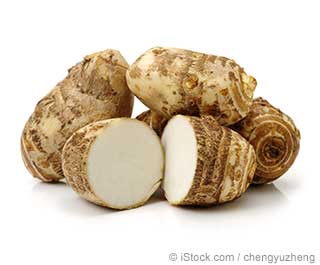Health Benefits Of Taro Root
The health benefits of taro root include its ability to improve digestive health, prevent cancer, improve vision health, and much more.
Digestive Health
One of the most important functions of taro root in the diet is its role in digestion. The high level of dietary fiber found in taro root (a single serving contains 27% of the daily requirement of dietary fiber) makes it very important for supporting our gastrointestinal health. Fiber helps to add bulk to our bowel movements, thereby helping food move through the digestive tract and facilitating improved digestion. This can help prevent certain conditions such as excess gas, bloating, cramping, constipation, and even diarrhea. A healthy, regulated gastrointestinal system can greatly boost your overall health and reduce your chances of various types of cancer.
Cancer Prevention
Speaking of cancer, taro root also plays an important part in the antioxidant activity in our body. The high levels of vitamin A, C, and various other phenolic antioxidants found in taro root boost our immune system and help eliminate dangerous free radicals from our system. Free radicals are the dangerous by-products of cellular metabolism that can cause healthy cells to mutate and turn into cancerous cells. By eliminating these free radicals, our general health is almost guaranteed! Cryptoxanthin, which is found in taro root, is directly connected to a lowered chance of developing both lung and oral cancers.
Diabetes Prevention
Dietary fiber can also help lower the chances of developing diabetes because it regulates the release of insulin and glucose in the body. If you have a sufficient level of fiber, which taro root provides, then you can manage your glycemic levels and lower your chances of developing diabetes. If you have diabetes, then fiber-rich foods like taro root can help prevent the dangerous spikes and plunges in blood sugar.
Improved Heart Health
Taro root contains a significant level of potassium, which is another of the essential minerals that we need to remain healthy and functional. Potassium not only facilitates healthy fluid transfers between membranes and tissues throughout the body but also helps to relieve stress and pressure on blood vessels and arteries. By relaxing the veins and blood vessels, blood pressure can be reduced and thus the stress on the overall cardiovascular system is reduced. Potassium has even been connected to increased cognitive function because neural connections can be boosted when blood pressure is reduced, and fluid transfer between neural membranes is optimized!
Vision Health
As mentioned above, taro root contains various antioxidants, including beta-carotene and cryptoxanthin. These antioxidants can help improve vision as well, by preventing free radicals from attacking ocular cells and causing macular degeneration or cataracts!
Skin Care
Between vitamin E and vitamin A, our skin is well protected when we add taro root to our diets. Both of these essential vitamins work to eliminate skin conditions and boost overall cellular health, meaning that our wounds and blemishes heal faster, wrinkles can be diminished, and a healthy glow can be returned to the skin. Taro root is nature’s little secret to healthier skin!
tarorootsinfoBoosts Immune System
Perhaps the most important element of taro root for health is its role in the immune system. It has a very high level of vitamin C in each serving, which stimulates the immune system to create white blood cells, which defend the body from foreign pathogens and agents. Furthermore, vitamin C acts as an antioxidant, which partially prevents the development of conditions such as heart disease and cancer.
Increased Circulation
The mineral content of taro root has dozens of useful applications, but the dual presence of iron and copper in taro root make it a very important food to prevent anemia and boost circulation throughout the body. Iron and copper are both essential for the production of red blood cells, which carry the all-important oxygen to our body’s systems and cells. It helps in lowering your chances of anemia (iron deficiency) and boosting the flow of blood through the body. This, in turn, helps increase the metabolic activity, growth of new cells, and general oxygenation of the body, which results in the organs and systems functioning at their optimal levels!
Word of Caution
The only major problem with taro root is its extremely high-calorie content. Every 100 grams contains 112 calories, which can be an issue for people trying to lose weight. It has more carbohydrates by volume than potatoes, so overdoing it with taro root can cause obesity if you aren’t careful. Eat taro root in moderation, to get the health benefits, without packing on the pounds!



 Contact Us
Contact Us







 Hospitals
Hospitals
 Doctors
Doctors
 Diagnostic
Diagnostic
 Pharmacy
Pharmacy
 Health Tips
Health Tips
 Blog
Blog

















Comments